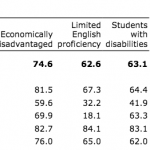There was an opinion piece published last month in Harpers, a well-known magazine titled “Abolish High School”. High school, the writer suggested, is such a horrible place that the entire institution of it should simply be eliminated.
Now here’s the interesting thing: The writer of this piece, Rebecca Solnit, never went to high school. So how could she be so sure that high school is such a horrendous experience that we should just get rid of it altogether? Well…she probably talked to a lot people. But talking to people isn’t really enough, right? I mean, this is the second oldest magazine in the United States. 190,000 people subscribe to Harpers. We’re talking rigorous journalism.
And besides, Rebecca Solnit is no slouch. She eventually went on to get her Masters degree at the University of California at Berkeley, one of the best journalism schools in the country. Rebecca Solnit did a heck of a lot more than just talk to people. She did academic research, she read journals, she consulted national databases of educational statistics.
There are many experts out there working hard to make big important claims about students and schools in general. According to the National Center for Education Statistics, not only are high school students a bunch of mean bullies, they are also lazy, apathetic, and lack persistence. Persistence is defined by this particular group of experts as the number of math and science courses taken, whether or not you graduate in four years, and whether or not you enroll in college right after college. Now all of this data might tell us something about the typical American high school student, but when I think about persistence, I think about my students and their stories:
- I think of the kid who leaves her house at the crack of dawn every single day to drive an hour to school each day.
- I think of the student who stayed on the basketball team for all four years until his team finally won the charter school championship title.
- I think of the student who spent months learning how to edit audio files so that he could share the story of his family’s financial struggles on public radio.
- I think of the student who had every reason to drop out of high school, but stuck it out because he wanted to be the first male in his family to graduate.
- When I think of persistence, I think of the student who failed a standardized test 8 times. He was finally told he never had to take it again. He did anyway. One more time. And passed.
This is not to suggest that we should ignore numbers. Statistics are important because they tell us about trends and patterns. But numbers don’t tell us the whole truth. Our students’ stories and experiences are just as true and important.
Now just as we don’t want to completely ignore numbers, we also need to be a little skeptical of them. Because numbers can sometimes trick us into believing that what has happened in a certain way for most people, will inevitably happen that way for all people. But probability is not destiny. Yes, the data is important, but it should not be what is most meaningful.
Our students’ stories are what matter the most and we may need to tell those stories again and again and again until other people start to understand how the so-called laws of probability work. We will need to remind statisticians, policy makers, and well-known writers that odds, by their very nature, are meant to be beaten, and that probability is by no means destiny.










Comments 2
For some reason, this post reminds me of that Ken Robinson TED talk where he points out that outliers in our data are often dismissed because they mess up the data.
I am so curious about that Harpers article now. What does she recommend in place of High School?
I enjoyed your examples of persistence in the face of the pre-conceived notions of academic persistence. When I think of persistence I think of the senior girl in my sophomore class this year, the strong and expressive dancer who had not yet passed the standardized test either, and became pregnant second semester. The school, according to her “didn’t wan’t to deal with ‘fat’ people” (i.e. pregnant people) and wanted her to switch to the alternative school and delay graduation. instead, despite her academic and personal struggles, she stuck with things, earned a B in my class, and graduated before she became a mother. Good for her. No brilliant point, here… but I also see a lot of successes each day.
Should high schools be constantly rethought and redesigned to meet the needs of our students? Sure. I am extremely curious about Solnit’s position.
I agree with basically everything in this post. But I would say that the cases you cite are data, too. The problem is there is no weighting factor for your examples. So any of the kids here would get a ton of “points” or whatever added to any assessment of their achievement by merit of their struggle, originality, passion, etc.